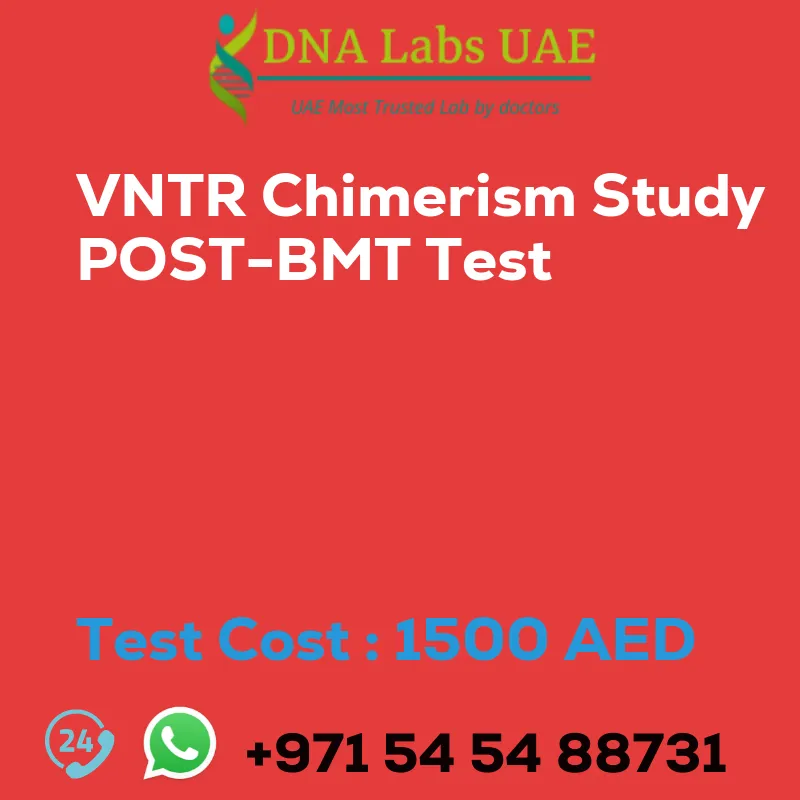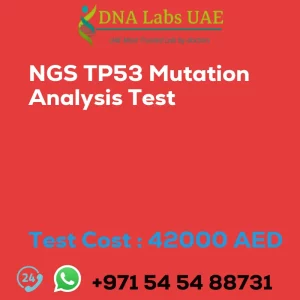VNTR Chimerism Study POST-BMT Test
Cost: AED 1500.0
Symptoms, Diagnosis, and Test Details
Test Name: VNTR Chimerism Study POST-BMT Test
Components: EDTA Vacutainer (2ml)
Price: 1500.0 AED
Sample Condition: Peripheral blood of Recipient after transplant & Peripheral blood of donor
Report Delivery: 3-4 days
Method: End Point PCR
Test Type: Genetics
Doctor: General Physician
Test Department: Pre Test Information
VNTR Chimerism Study POST-BMT can be done with a doctor’s prescription. Prescription is not applicable for surgery and pregnancy cases or people planning to travel abroad.
Test Details:
VNTR chimerism study is a type of study conducted after a bone marrow transplant (BMT) to assess the level of chimerism in the recipient. Chimerism refers to the presence of two genetically distinct populations of cells in an individual, which can occur after a BMT when the transplanted bone marrow cells (graft) coexist with the recipient’s own cells (host).
The study involves analyzing the Variable Number Tandem Repeats (VNTR) in the DNA of the recipient and the donor to determine the proportion of each population of cells. VNTRs are repetitive DNA sequences that vary in length among individuals and can be used as genetic markers to differentiate between donor and recipient cells.
The process of VNTR chimerism study usually involves collecting blood or bone marrow samples from the recipient at regular intervals after the BMT. The DNA from these samples is then extracted and analyzed using various techniques, such as polymerase chain reaction (PCR) or fragment analysis, to determine the VNTR profiles of the recipient and the donor. By comparing the VNTR profiles of the recipient and the donor, the level of chimerism can be quantified.
A high level of chimerism indicates a successful engraftment of the donor cells, while a low level of chimerism may suggest graft rejection or relapse of the underlying disease. VNTR chimerism study is an important tool in monitoring the progress and outcomes of BMT. It helps clinicians to assess the effectiveness of the transplant, detect early signs of graft rejection or relapse, and make informed decisions regarding further treatment or interventions.
| Test Name | VNTR Chimerism Study POST-BMT Test |
|---|---|
| Components | EDTA Vacutainer (2ml) |
| Price | 1500.0 AED |
| Sample Condition | Peripheral blood of Recepient after transplant & Peripheral blood of donor |
| Report Delivery | 3-4 days |
| Method | End Point PCR |
| Test type | Genetics |
| Doctor | General Physician |
| Test Department: | |
| Pre Test Information | VNTR Chimerism Study POST-BMT] can be done with a Doctors prescription. Prescription is not applicable for surgery and pregnancy cases or people planing to travel abroad. |
| Test Details |
VNTR chimerism study is a type of study conducted after a bone marrow transplant (BMT) to assess the level of chimerism in the recipient. Chimerism refers to the presence of two genetically distinct populations of cells in an individual, which can occur after a BMT when the transplanted bone marrow cells (graft) coexist with the recipient’s own cells (host). The study involves analyzing the Variable Number Tandem Repeats (VNTR) in the DNA of the recipient and the donor to determine the proportion of each population of cells. VNTRs are repetitive DNA sequences that vary in length among individuals and can be used as genetic markers to differentiate between donor and recipient cells. The process of VNTR chimerism study usually involves collecting blood or bone marrow samples from the recipient at regular intervals after the BMT. The DNA from these samples is then extracted and analyzed using various techniques, such as polymerase chain reaction (PCR) or fragment analysis, to determine the VNTR profiles of the recipient and the donor. By comparing the VNTR profiles of the recipient and the donor, the level of chimerism can be quantified. A high level of chimerism indicates a successful engraftment of the donor cells, while a low level of chimerism may suggest graft rejection or relapse of the underlying disease. VNTR chimerism study is an important tool in monitoring the progress and outcomes of BMT. It helps clinicians to assess the effectiveness of the transplant, detect early signs of graft rejection or relapse, and make informed decisions regarding further treatment or interventions. |








